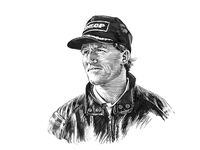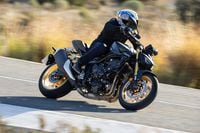A two-time ama grand national champion, Kenny Roberts took it upon himself to make a run at the 1978 500cc Grand Prix World Championship as a rookie. And he won it. Then Roberts won again, in 1979 and 1980. Brash, confident, and driven to a fault, Roberts came, saw, and conquered, and in the process, he positioned America as the world's preeminent Grand Prix superpower for a decade and a half.
Before you even showed up in Europe to make a full-time run at a 500cc World Championship, you let it be known that the Grand Prix riders didn’t intimidate you on any level whatsoever. Thoughts?
I went to do Imola right after winning in dirt track at Ascot Park. When we landed in Milan in Italy, I told a group of reporters: “Giacomo Agostini? Why is he so great? Bullsh-t. He never rode the 8-Mile National. I never saw him win Ascot.” I pissed everybody off. The press went crazy. Kel [Carruthers] had to drag me away. When we hit the Imola track, I was going to kick his ass. I said, “Bring it on, dude!” You had to really be on your toes at those Ascot races. Because the track was so tacky, you didn’t need a perfect bike—you didn’t need a Harley-Davidson to win the race. You could win on a Yamaha if you knew how to ride it better than anyone else. Ascot was really fierce at that time. So, when I was at Imola, everyone kept saying, “Agostini! Agostini!” So I said, “Well, I’ve never seen Agostini race Ascot, so I don’t know how good he is.”
You marked your first full 500cc World Championship season in 1978. That year, you won three races and took rival Barry Sheene down to the last race of the year to win your first World Championship. What was that like?
The problem at that time was that I only had one motorcycle. I was a support rider. I wasn’t a factory rider. The big problem I had was that the Goodyears I was using had never seen the racetracks of Europe, and so I had to test tires and learn the racetracks in that first year. It was so different then. Not only did I have the European thing to think about and worry about, but also two kids and a wife and a motorhome. It was a hell of a year. Luckily for me, I didn’t think about any of that stuff. It wasn’t on my radar. The only thing I was really worried about was learning the racetracks and winning races.
Along the way, you got tapped with the nickname “the Martian.” What was that about?
They still call me that in Europe. I’ll check into a hotel or be at the airport, and someone will say “Marciano!” That is Spanish for Martian. It stuck. Why do they call me that? I think it started in Spain because I was passing people on the inside and on the outside. In Grand Prix racing at that time, they didn’t see that very much. They saw some of the things I was doing in passing guys on the outside and all of that, and said, “This guy is not from this Earth. He must be a martian.” That stuck.
Racing in your era compared with MotoGP today. Are they as radically different as they seem?
Oh, yeah. It’s professional now. It’s what I wanted it to be when I was there. We were getting paid peanuts. And the racetracks were dangerous; nobody gave a shit about that either. I got to thinking, Why can’t this be the way it should be? Everyone would then say to me: “Well, you’re an American. You can say that.” I never figured that out until later on in my life. The problem there was that these riders from other nations, their federations would help them. Their federations had skin in the game. And the AMA, well, they hated me. Why would they help me? I think without me saying the things that I did at that time, I don’t know when motorcycle racing would have gotten professional to the point that it is now. They’ve done a great job with what they’ve had to work with. It was a pretty rocky road to begin with Dorna, but they pulled it out of the hat.
You’re the father of 2000 500cc World Champion Kenny Roberts Jr. How does that feel?
That’s probably the thing I think about the most. That was all a lot tougher on him than it was on me. When we started racing, I said to him: “You’re never going to be as good as me, even if you’re better than me.” People are always going, “Oh, he’s not as good as his dad.” Kenny got a lot of that, and I told him: “If you can handle that, you can race. If that’s going to bother you, I’d just as soon you not race.” It didn’t bother him at all. I don’t know how it didn’t, but it didn’t. That’s the achievement I’m most proud of.











/cloudfront-us-east-1.images.arcpublishing.com/octane/G4MG6OUCJNBSHIS2MVVOTPX65E.jpg)
/cloudfront-us-east-1.images.arcpublishing.com/octane/IIGGWFOTOJGB7DB6DGBXCCMTDY.jpg)
/cloudfront-us-east-1.images.arcpublishing.com/octane/QSTCM6AVEZA5JJBUXNIQ3DSOF4.jpg)
/cloudfront-us-east-1.images.arcpublishing.com/octane/U4I7G625B5DMLF2DVIJDFZVV6M.jpg)
/cloudfront-us-east-1.images.arcpublishing.com/octane/B6XD6LS6IVCQPIU6HXDJSM3FHY.jpg)
/cloudfront-us-east-1.images.arcpublishing.com/octane/ICL63FEDDRDTTMINYICCEYGMDA.jpg)
/cloudfront-us-east-1.images.arcpublishing.com/octane/FCGZHQXRBZFLBAPC5SDIQLVF4I.jpg)
/cloudfront-us-east-1.images.arcpublishing.com/octane/WNOB6LDOIFFHJKPSVIWDYUGOPM.jpg)

/cloudfront-us-east-1.images.arcpublishing.com/octane/X33NU3E525ECRHXLNUJN2FTRKI.jpg)
/cloudfront-us-east-1.images.arcpublishing.com/octane/6KKT5NNL2JAVBOXMZYS5ZO76YA.jpg)
/cloudfront-us-east-1.images.arcpublishing.com/octane/J5RKG5O455GMPGQRF2OG6LRT7A.jpg)
/cloudfront-us-east-1.images.arcpublishing.com/octane/GX2CIZKQVRH2TATDM26KFG2DAE.jpg)
/cloudfront-us-east-1.images.arcpublishing.com/octane/ZWIDYSAKQZHD5BHREMQILXJCGM.jpg)
/cloudfront-us-east-1.images.arcpublishing.com/octane/CYUHJZCTSJCH3MRAQEIKXK7SCQ.jpg)
/cloudfront-us-east-1.images.arcpublishing.com/octane/LKOFINY56FCXJCANJ5M7ZDQUBY.jpg)
/cloudfront-us-east-1.images.arcpublishing.com/octane/4NBPDACMWJH63JQYJVK3QRBDZI.jpg)
/cloudfront-us-east-1.images.arcpublishing.com/octane/KKHQHRR3FJGX7H2IPU6RALMWG4.jpg)

/cloudfront-us-east-1.images.arcpublishing.com/octane/5IOFS5JAE5FOXMNA23ZRAVVYUU.jpg)
/cloudfront-us-east-1.images.arcpublishing.com/octane/CGXQ3O2VVJF7PGTYR3QICTLDLM.jpg)

/cloudfront-us-east-1.images.arcpublishing.com/octane/OQVCJOABCFC5NBEF2KIGRCV3XA.jpg)
/cloudfront-us-east-1.images.arcpublishing.com/octane/OPVQ7R4EFNCLRDPSQT4FBZCS2A.jpg)